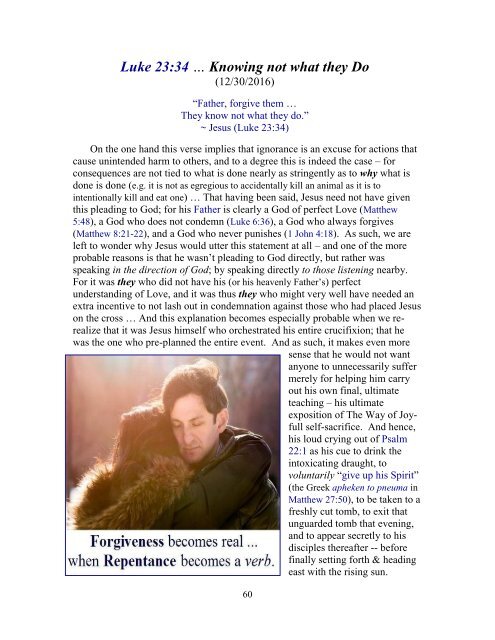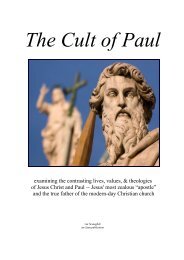My Favorite Verses - Vol IV (Nov 16 to Feb 17)
A collection of brief commentaries on some of the Bible’s most beloved (and often least understood) passages, parables, verses & sayings
A collection of brief commentaries on some of the Bible’s most beloved
(and often least understood) passages, parables, verses & sayings
Create successful ePaper yourself
Turn your PDF publications into a flip-book with our unique Google optimized e-Paper software.
Luke 23:34 … Knowing not what they Do<br />
(12/30/20<strong>16</strong>)<br />
“Father, forgive them …<br />
They know not what they do.”<br />
~ Jesus (Luke 23:34)<br />
On the one hand this verse implies that ignorance is an excuse for actions that<br />
cause unintended harm <strong>to</strong> others, and <strong>to</strong> a degree this is indeed the case – for<br />
consequences are not tied <strong>to</strong> what is done nearly as stringently as <strong>to</strong> why what is<br />
done is done (e.g. it is not as egregious <strong>to</strong> accidentally kill an animal as it is <strong>to</strong><br />
intentionally kill and eat one) … That having been said, Jesus need not have given<br />
this pleading <strong>to</strong> God; for his Father is clearly a God of perfect Love (Matthew<br />
5:48), a God who does not condemn (Luke 6:36), a God who always forgives<br />
(Matthew 8:21-22), and a God who never punishes (1 John 4:18). As such, we are<br />
left <strong>to</strong> wonder why Jesus would utter this statement at all – and one of the more<br />
probable reasons is that he wasn’t pleading <strong>to</strong> God directly, but rather was<br />
speaking in the direction of God; by speaking directly <strong>to</strong> those listening nearby.<br />
For it was they who did not have his (or his heavenly Father’s) perfect<br />
understanding of Love, and it was thus they who might very well have needed an<br />
extra incentive <strong>to</strong> not lash out in condemnation against those who had placed Jesus<br />
on the cross … And this explanation becomes especially probable when we rerealize<br />
that it was Jesus himself who orchestrated his entire crucifixion; that he<br />
was the one who pre-planned the entire event. And as such, it makes even more<br />
sense that he would not want<br />
anyone <strong>to</strong> unnecessarily suffer<br />
merely for helping him carry<br />
out his own final, ultimate<br />
teaching – his ultimate<br />
exposition of The Way of Joyfull<br />
self-sacrifice. And hence,<br />
his loud crying out of Psalm<br />
22:1 as his cue <strong>to</strong> drink the<br />
in<strong>to</strong>xicating draught, <strong>to</strong><br />
voluntarily “give up his Spirit”<br />
(the Greek apheken <strong>to</strong> pneuma in<br />
Matthew 27:50), <strong>to</strong> be taken <strong>to</strong> a<br />
freshly cut <strong>to</strong>mb, <strong>to</strong> exit that<br />
unguarded <strong>to</strong>mb that evening,<br />
and <strong>to</strong> appear secretly <strong>to</strong> his<br />
disciples thereafter -- before<br />
finally setting forth & heading<br />
east with the rising sun.<br />
60


















